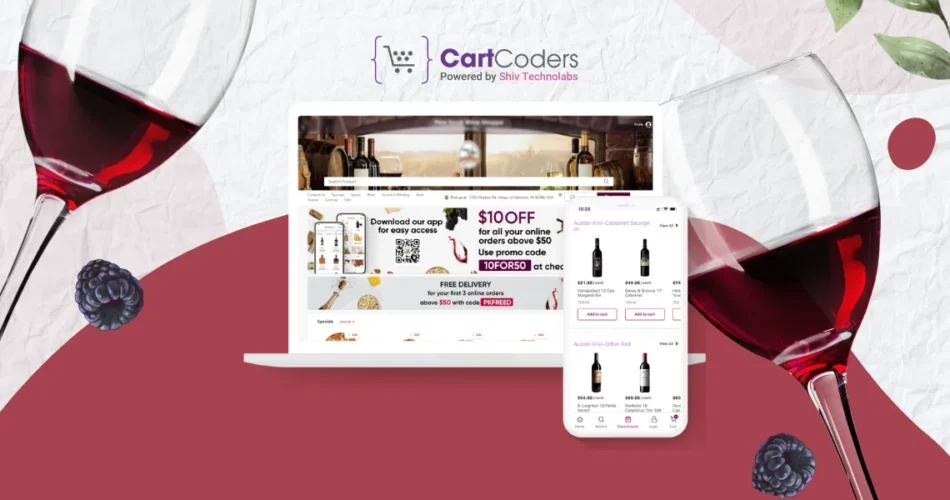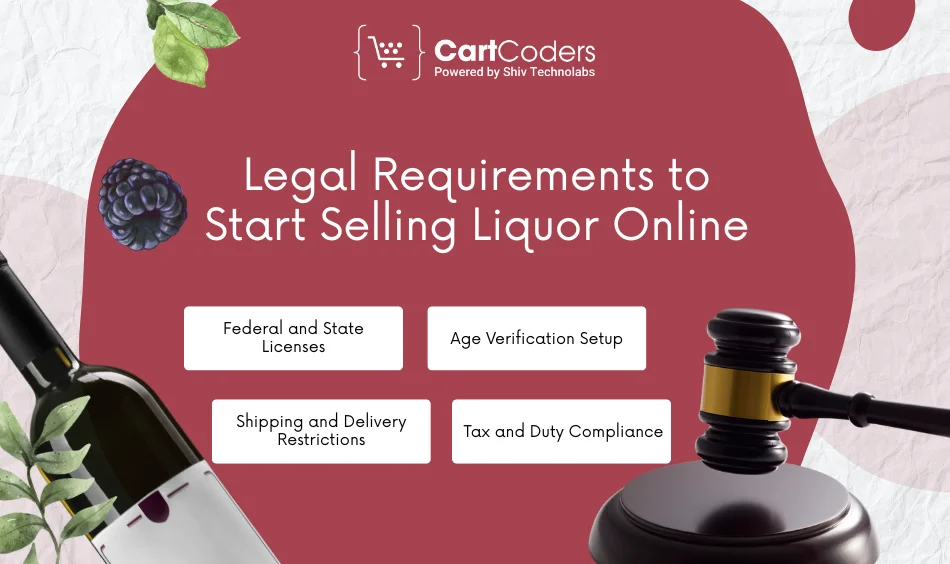Custom Engagement Solutions
Unlock tailored solutions with a free, no-obligation strategy session.
Expert Developers & Engineers on Demand
Scale Your Team with Skilled IT Professionals
Expert Guidance for Digital Transformation

Selling liquor online has moved far beyond novelty — it’s a fast-growing retail shift. Statista projects global online alcohol sales to cross $50 billion by 2027, driven by premium selections, home delivery convenience, and new-age buyers. For liquor brands, this digital shift isn’t just about going online; it’s about creating direct relationships with customers while keeping every sale compliant.
From age verification to regional shipping rules, there are unique challenges that come with selling alcohol online. But with the right eCommerce setup, it becomes manageable and profitable. Platforms like Shopify make it easier for wine, beer, and spirit sellers to launch compliant, branded stores.
In this guide, we’ll walk through every step — from licensing and setup to scaling your liquor brand faster through smart marketing and tech-driven tools.
The liquor industry is one of the few retail sectors where tradition meets digital opportunity. A report by IWSR found that online alcohol sales grew nearly 35% year-over-year in recent times — outpacing most other product categories. That growth highlights one thing: customers prefer convenience over checkout lines.
When you sell liquor online, you get more than just sales — you get data. Direct-to-consumer (D2C) stores help you understand buying trends, repeat purchase behavior, and seasonal demand. You can tailor discounts and bundles for loyal buyers, introduce exclusive vintages, or even run local delivery campaigns.
Unlike traditional stores limited by geography, an online liquor store lets you reach legal buyers in multiple regions while keeping operations simple. You control pricing, branding, and promotions — the foundation for long-term brand growth.

Before launching your liquor store, compliance must come first. Alcohol sales are heavily regulated, and each region has its own set of laws. Missing even one requirement can result in license suspension or blocked shipments.
To sell liquor online in the U.S., you need both federal permits (through the Alcohol and Tobacco Tax and Trade Bureau) and state licenses where you plan to ship. Each state has separate rules on distribution, labeling, and taxes.
You must confirm that every buyer is of legal drinking age. Most Shopify liquor stores add age-gate popups and use plugins like Age Check+ or NA Age Gate to verify identity before checkout.
Many states limit the interstate shipping of alcohol. Partnering with approved couriers like UPS, FedEx, or regional carriers helps maintain compliance. Always mention restricted areas on your store’s checkout page.
Different states apply separate excise duties and sales taxes. Integrating tools like Avalara or TaxJar simplifies automatic tax calculations for each region.
By meeting these legal checkpoints early, your store builds credibility and avoids interruptions once you start taking orders.
Must Read: Boost Compliance With Simple Age Verification For Your Wine eCommerce Store
The platform you choose will shape how easily your liquor store runs and scales. Liquor brands often start with Shopify because it supports licensed alcohol sellers through dedicated apps and integrations that simplify compliance and sales.
While custom-coded websites offer full control, they often require higher maintenance. Shopify, on the other hand, gives liquor sellers a structured, secure foundation — ideal for quick setup and scalability. It supports legal product listings, payment gateways, and inventory sync across multiple warehouses.
Key Features You Should Look For:
Choosing an eCommerce platform like Shopify also gives you access to apps that handle bottle deposits, shipping restrictions, and customer loyalty programs — all essential for liquor eCommerce.
Your liquor store design should do more than look good — it should make visitors buy. Every page should reflect your brand story, display trust signals, and guide shoppers smoothly to checkout.
Highlight bestsellers, limited editions, and featured collections right above the fold. Use high-quality bottle shots, tasting visuals, and short taglines that reflect the flavor or origin.
Add clear product details — alcohol type, ABV percentage, origin, serving suggestions, and packaging size. Include customer reviews and tasting notes to create authenticity.
Reduce clicks. Offer multiple payment options and integrate age verification before final payment. Mention delivery times and restrictions upfront to avoid cart abandonment.
Allow users to sort by brand, type (wine, whiskey, beer), or price. For stores with hundreds of SKUs, add predictive search to help users find products faster.
Most alcohol purchases start on mobile. Use responsive design, quick add-to-cart buttons, and auto-filled address forms to shorten checkout time.
A thoughtful structure with trust badges, SSL security, and transparent policies not only drives conversions but also builds long-term loyalty.
Running a liquor eCommerce store isn’t only about listing products — automation keeps your operations smooth and compliant. The right integrations help you manage age checks, shipping, loyalty, and analytics from one place.
| Integration | Purpose | Example Tools |
| Age Verification | Blocks underage users before checkout | Age Check+, NA Age Gate |
| Shipping Management | Automates label creation and real-time tracking | ShipStation, EasyShip, Shiprocket |
| POS & Inventory Sync | Tracks stock across online and retail outlets | Shopify POS, Square |
| Loyalty & Rewards | Encourages repeat purchases and referrals | Smile.io, Yotpo Loyalty |
| Analytics & Reporting | Monitors conversions, regions, and sales data | Shopify Reports, Google Analytics 4 |
| Email & SMS Automation | Sends restock alerts and promotional campaigns | Klaviyo, Omnisend |
Integrating these tools early keeps your store consistent, reduces manual work, and helps you deliver a reliable buying experience — essential for scaling your liquor brand faster.

Marketing liquor online comes with restrictions, but smart planning can help you reach customers effectively. Focus on storytelling, retention, and compliant ad strategies to grow your brand faster.
Share how your liquor is crafted — highlight its region, flavor notes, or brewing style. Buyers love authenticity, and it gives your brand an edge over resellers.
Since ad platforms limit alcohol promotions, direct communication becomes crucial. Use tools like Klaviyo or Omnisend to send seasonal offers, tasting event invites, and restock alerts.
Collaborate with sommeliers, bartenders, or lifestyle creators who have an adult audience. Sponsor local tasting events or mixology workshops to build brand trust offline.
Use keywords like “buy wine online in Austin” or “order whiskey in Miami.” Update Google My Business and create city-focused landing pages.
Offer monthly wine or whiskey boxes. Reward loyal buyers with points, discounts, or early access to limited editions.
While direct alcohol ads are restricted, platforms like Google and Facebook allow age-restricted awareness campaigns in approved regions. Always target verified age groups and follow ad guidelines.
A mix of storytelling, direct engagement, and loyalty programs can double repeat sales while staying within compliance limits.
Selling liquor online can be profitable, but it also brings its own set of obstacles. Understanding them early helps you plan better and maintain smooth operations.
| Challenge | Description | Quick Fix |
| Shipping Restrictions | Some states or countries don’t allow interstate or cross-border alcohol shipping. | Partner with licensed carriers like UPS or FedEx and display restricted zones in your store. |
| Payment Gateway Limitations | Many processors don’t support alcohol sales due to regulations. | Use approved gateways such as Authorize.net, Shopify Payments (with approval), or Stripe for Alcohol. |
| Ad Policy Restrictions | Major ad platforms have strict rules for liquor promotions. | Focus on email, influencer marketing, and local SEO instead of relying only on paid ads. |
| High Return Risks | Broken or leaked bottles lead to refunds and losses. | Use custom packaging and add insurance through your courier. |
| Age Verification Gaps | Manual checks can lead to non-compliance. | Automate verification with apps like Age Check+ or ShopAgeGate. |
| Compliance Updates | Laws differ by state and change often. | Regularly consult your state’s Alcohol Control Board website or use compliance monitoring services. |
Addressing these challenges upfront saves time, avoids penalties, and helps your brand maintain trust with every sale.
How a Boutique Wine Brand Grew Its Online Sales by 300% in 6 Months
A small Napa Valley winery struggled with low retail visibility and seasonal demand. Their tasting room generated limited sales, and wholesale margins were shrinking. The brand decided to go digital with a Shopify-based wine store to reach direct buyers across multiple U.S. states.
What They Did:
Result:
Within six months, their online revenue grew 300%, repeat customers increased by 45%, and packaging errors dropped by 60% due to system automation.
This case shows how even niche liquor brands can scale quickly with the right tech stack, compliance setup, and branding strategy.
Starting a liquor eCommerce store is exciting, but success depends on the right technical setup and compliance flow. That’s where CartCoders helps liquor, wine, and alcohol brands build stores that are both user-friendly and legally compliant.
Our team designs and develops Shopify-based liquor websites that handle everything — from age verification and product filtering to advanced shipping rules and recurring subscriptions. We help you focus on branding while ensuring your store meets every regulation for alcohol sales.
Whether you’re a boutique winery or a nationwide liquor retailer, we can set up your Shopify store with secure checkout, real-time inventory sync, and a design that fits your brand’s story.
Ready to sell liquor online the right way?
Let’s build your compliant and conversion-driven Shopify liquor store today.
Selling liquor online isn’t just about listing bottles — it’s about building trust, staying compliant, and creating an experience that reflects your brand’s quality. From legal licensing to platform selection and marketing, every step matters in making your store profitable and future-ready.
Shopify gives liquor and wine sellers the right balance of simplicity, compliance, and scalability. With the right apps, age-verification systems, and smart marketing, your brand can connect directly with loyal buyers while growing faster than traditional retail ever could.
If you’re planning to launch or upgrade your liquor store, CartCoders can help you make it happen. Our experts design custom Shopify liquor websites that follow every regulation and turn browsing customers into returning buyers.
Your brand deserves a digital store that sells with style and compliance — let’s build it together.
Contact us today for more info!
Yes. You can sell liquor online in the U.S., but you must obtain federal and state licenses, follow age-verification laws, and ship only to states that permit alcohol delivery.
You’ll need a federal basic permit from the Alcohol and Tobacco Tax and Trade Bureau (TTB) and state-level licenses based on where you plan to ship.
To sell wine online legally, you must secure the required alcohol permits, verify every buyer’s age, and follow state-specific shipping laws. Platforms like Shopify help manage compliance through age gates and approved carrier integrations.
Shopify is ideal for liquor eCommerce. It supports age-gate tools, regional tax settings, and integrations for compliance, shipping, and inventory management.
Use Shopify apps like Age Check+ or NA Age Gate. These verify the customer’s age at entry or before checkout, keeping your store compliant.
Only if permitted by both states involved. Always review local shipping laws and partner with licensed carriers like UPS or FedEx that handle alcohol deliveries.
Payment processors like Authorize.net, Shopify Payments (on approval), and Stripe for Alcohol support compliant liquor transactions.
Focus on email, influencer collaborations, and SEO-based campaigns. Share product stories, tasting notes, and local keywords to attract organic traffic.
Yes. Direct-to-consumer liquor stores enjoy higher margins and repeat customers. Subscription models and loyalty programs further increase long-term profits.
CartCoders specializes in custom Shopify liquor store development, including age-verification setup, legal compliance, regional shipping, and loyalty programs. We help you launch faster and grow confidently.
Projects delivered in 15+ industries.
95% retention rate, building lasting partnerships.
Serving clients across 25+ countries.
60+ pros | 10+ years of experience.